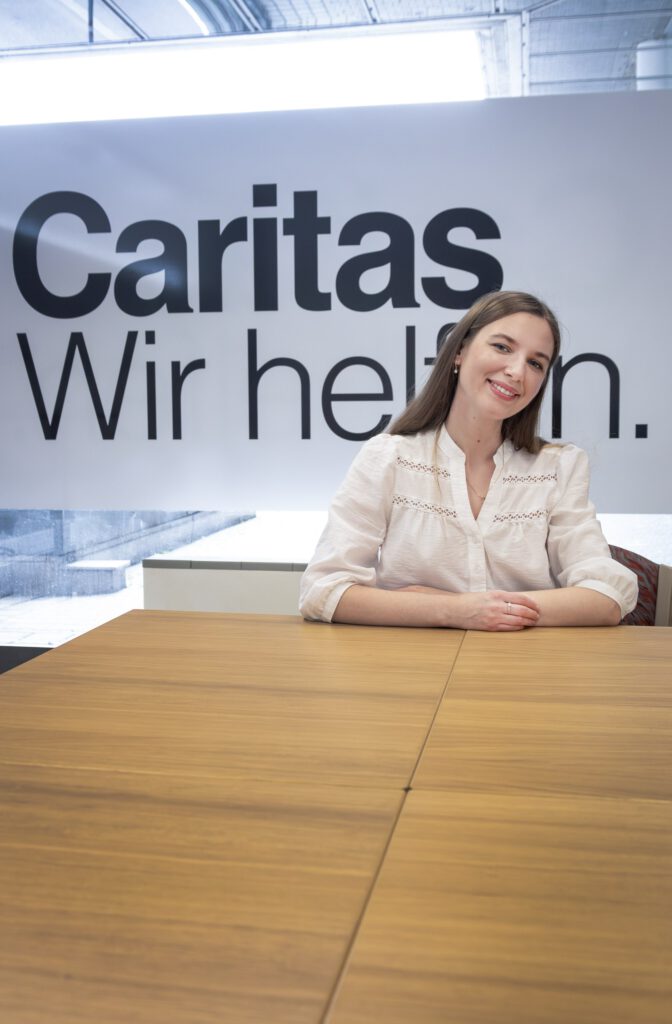
11 June 2024
Kateryna Tymoshenko: “By combining our mutual efforts, we have power in our hands and can act more efficiently together”
Kateryna Tymoshenko, Professional Integration HUB program participant (Caritas Austria).
- Age: 26 years old
- City in Ukraine where you lived before the full-scale invasion (forced relocation): Kyiv
- Specialization: Humanitarian aid
PROFESSIONAL BACKGROUND
Before the full-scale invasion, I provided translation and interpretation services and worked as a personal assistant at a private aviation company engaged in humanitarian, stabilization, and peacekeeping missions worldwide.
I worked in a very fast-paced environment and coordinated a large team of engineers. Unfortunately, natural disasters and violent conflicts occur frequently. I always needed to be ready to respond promptly and offer the administrative assistance required for the management of the team.
Many of my former colleagues from the aviation company, that I worked for, are now defending our country. Friends of mine, who are linguists and translators, are actively engaged in aiding vulnerable communities and working on international development projects in Ukraine. Everyone is going above and beyond, dedicating as much effort as possible to stabilize the situation and restore peace and independence.
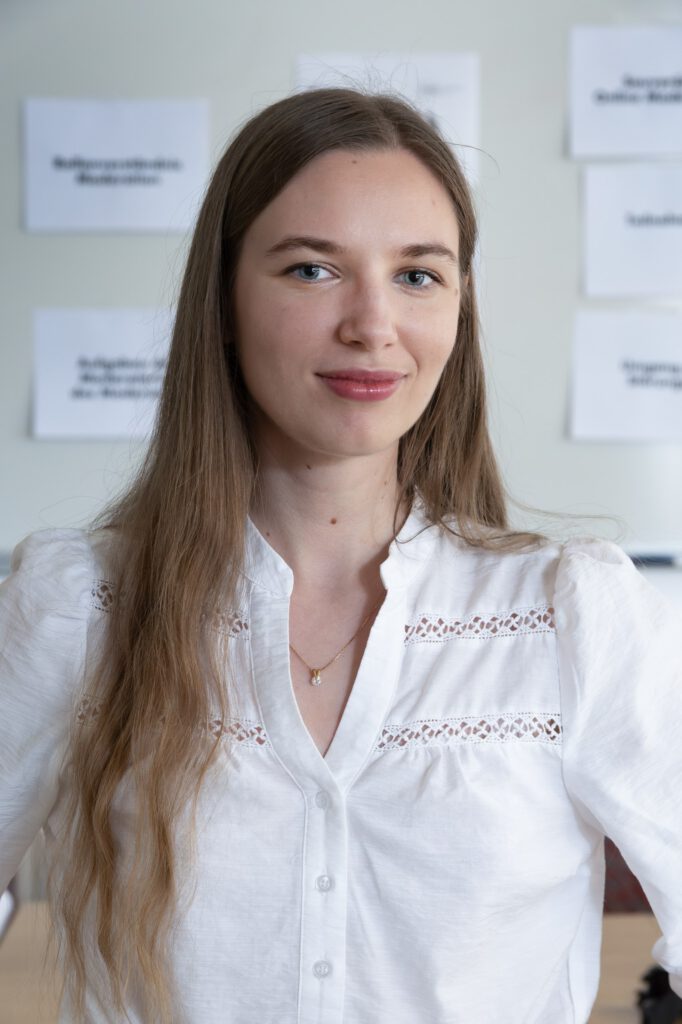
FORCED EMIGRATION
The war found me in Kyiv, Ukraine. It was supposed to be an ordinary working day, and nobody could believe that a war would start. However, like my fellow citizens, I awoke to the sound of explosions.
I spent a week in Kyiv, mostly in shelters, before deciding to leave for a safer place. I first went to Chernivtsi but later decided to move to Austria. During this time, I was also looking for ways to help my family in Chernihiv leave the city, which was partially occupied at that time.
Austria was the first country I went to following the full-scale invasion. I chose Austria because I knew some German, and it was not too far from Ukraine. At first, I believed I would be there for just a few weeks and return home soon.
LIFE IN AUSTRIA
It took some time and effort to stabilize and organize life in Austria, establish new social circles, get used to the way things work in areas such as healthcare and education, learn the German language, find housing, and more.
The language barrier was a significant challenge for my family. If you are not proficient in German, communication and integration can be difficult. It took a while to get used to everything and learn the language so we could communicate efficiently, connect with different institutions, and study and work.
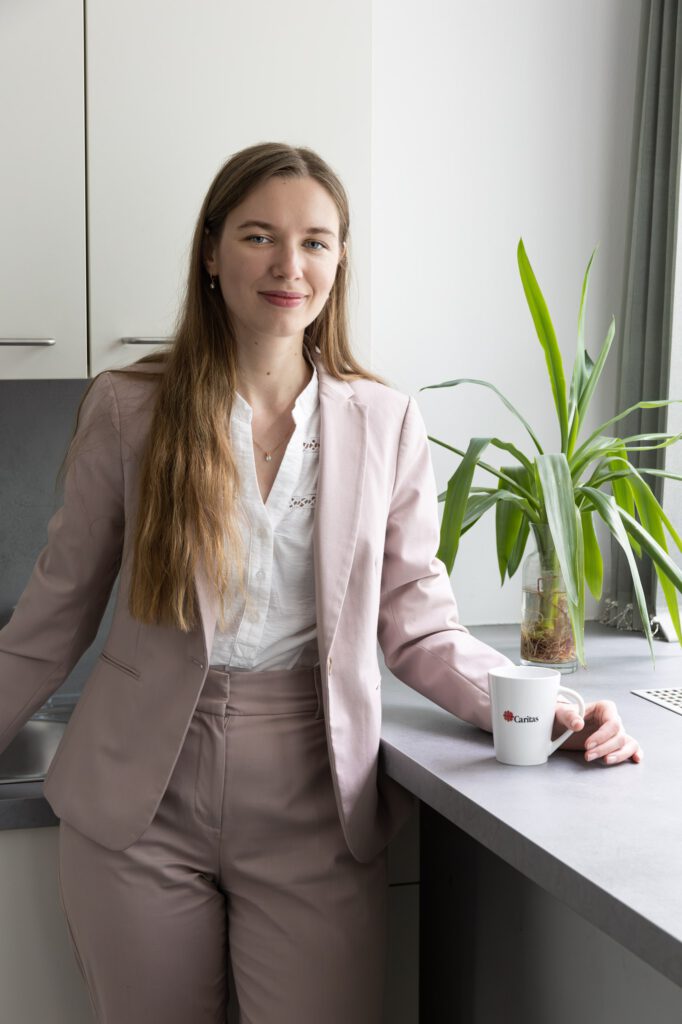
I need to mention that we have been fortunate to meet many kind people in Austria and are deeply grateful for the incredible support from Austrian authorities and citizens. All of this has made our integration smoother.
What surprised and impressed me in my professional development and employment?
- Legal requirements: Meeting the legal requirements for employment, such as nostrification of documents and language proficiency certifications, can be time-consuming. Getting acquainted with Austria’s labor laws and regulations proved challenging, particularly given the differences from those in Ukraine.
- Differences in work culture: Adapting to the work culture and practices in Austria takes time, especially in a multicultural environment, when working together with people from diverse cultures and backgrounds.
- Professional opportunities: I am exploring how my skills and expertise can be used successfully in the Austrian labor market, seeking professional opportunities, and considering how I can positively contribute to Ukraine’s future too.
My family and friends provide emotional support and encouragement in my daily life during emigration. Engaging in hobbies and maintaining an active lifestyle gives me a sense of fulfillment and helps me manage stress. Being involved in projects related to Ukraine allows me to stay connected with my homeland and make a meaningful contribution, bringing a sense of purpose and satisfaction to my daily life.
What advice would I give to the Ukrainians living abroad? Stay determined, keep pushing forward, and believe in yourself.
PROFESSIONAL INTEGRATION HUB
When I came across the advertisement on Facebook and read the details about the Professional Integration HUB program, I knew right away that it was exactly what I had been looking for – an opportunity to develop skills and expand my network.
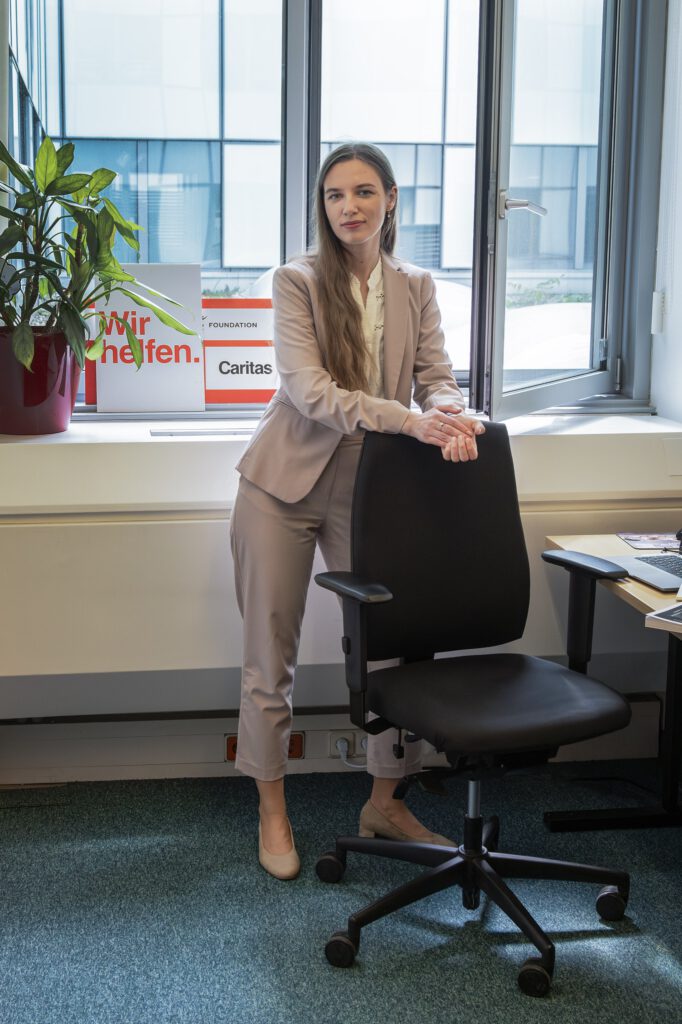
My main objectives were to expand my network of contacts, connect with individuals who shared my interests, improve my knowledge and interpersonal skills, and advance my proficiency in German. I aimed to deepen my integration within the professional community and gain valuable insights into projects led by Austrian organizations with a focus on Ukraine. Those expectations stayed the same, and I’m happy to say they were pretty much met. Over the course of three months, I experienced a highly productive period and acquired valuable skills and knowledge.
My internship was great! As an intern in Corporate Fundraising and Philanthropy at Caritas Austria, I supported my team in attracting new partners and foundations. We developed initiatives that would help thousands of people worldwide, especially in my homeland, Ukraine. I greatly appreciate my team’s support and the opportunity to learn from experienced professionals. I hope that I will soon be able to contribute to the reconstruction of Ukraine with what I have learned here in Austria.
I was interested in learning more about the projects that Caritas implements in Ukraine, and I received tasks to research Ukrainian-related topics. I was also fortunate to have meetings with representatives from Caritas Ukraine, where I learned more about the current situation and their important work.
It is difficult to compare working in Ukraine with working abroad, as these experiences are quite different. I have changed fields and roles, so it is challenging to draw a clear conclusion. One notable difference is how organizations are structured. In Austria, they use a lot of digital tools and custom software to get work done faster. Employees have more independence in decision-making and greater responsibility. In Ukraine, there used to be more centralized control, requiring approval from management for various tasks. In today’s Ukraine, organizations and companies must quickly address new challenges, so I believe work processes have changed significantly.
On the other hand, employees in Ukraine tend to be more flexible and confident benefitting from the familiar environment and native language, which facilitates quicker access to information. When living abroad, language improvement is an aspect we always need to work on, but it is a rewarding challenge. I noticed that communication flowed more easily with Ukrainian colleagues because we shared a common language and cultural understanding. However, in Austria, where colleagues come from diverse cultural backgrounds and speak different languages, effective cooperation can take longer to establish. It requires effort and patience to find common ground and understand each other’s cultural nuances, but it also brings exceptional value. Diversity means celebrating a variety of experiences and perspectives.
The moment during the internship that left a lasting impression on me was when I assisted colleagues from a partner organization of Caritas Austria in Kharkiv in meeting the Austrian press. Despite difficult conditions and life-threatening situations, the Social Aid Service team in Kharkiv is accomplishing superhuman actions. Thanks to donations and public funds, they distribute food and hygiene packages, offer psychosocial support to children, support families, provide mobile care for the elderly, and more. The experiences shared by Ukrainian colleagues and the projects they undertake to support people show how they persevere and find strength in helping each other.
At the same time, in the meeting with donors, I observed genuine concern for the current situation in Ukraine and a willingness to offer support. By providing financial assistance, donors feel a sense of involvement and engagement. Fundraising is a very powerful instrument that connects people and brings value to society.
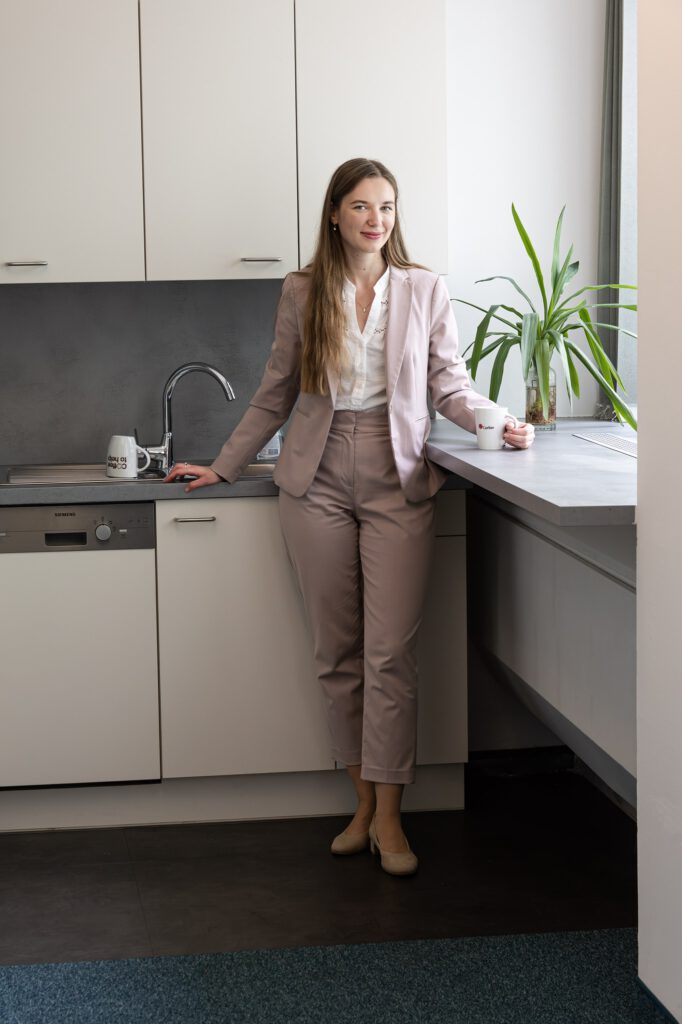
My internship provided a fascinating immersion into the Austrian professional landscape. Observing society through the lens of diverse institutions, NGOs, and organizations was eye-opening for me. It was not just about understanding the challenges, but also witnessing how these organizations tackle them through projects and collaboration that truly resonated.
My key insights include the importance of being open to each opportunity and open to communication with various people. By combining our mutual efforts, we have power in our hands and can act more efficiently together!
PLANS AFTER PARTICIPATING IN THE PROGRAM
I would like to develop and implement projects that will be beneficial for Ukrainian society and continue progressing in international partnerships and project management. With proficiency in multiple languages and experience collaborating with international teams, I believe I have the resources and skills to advance professionally and make a meaningful impact on the progress of Ukrainian society.
In my opinion, the European experience would be particularly valuable for Ukraine in several areas. Firstly, implementing best practices in governance, education, healthcare, and infrastructure development can greatly contribute to Ukraine’s progress. Secondly, adopting European practices in organizational management and transparency could strengthen Ukrainian NGOs and institutions. Furthermore, learning from European fundraising strategies can help diversify funding sources and engage with partners more effectively. Partnering with European organizations enables access to expertise, resources, and larger networks. Overall, adopting European experience in these areas can significantly benefit Ukraine’s development journey and contribute to positive societal changes.
Series of Interviews with Participants of the Professional Integration HUB Program.